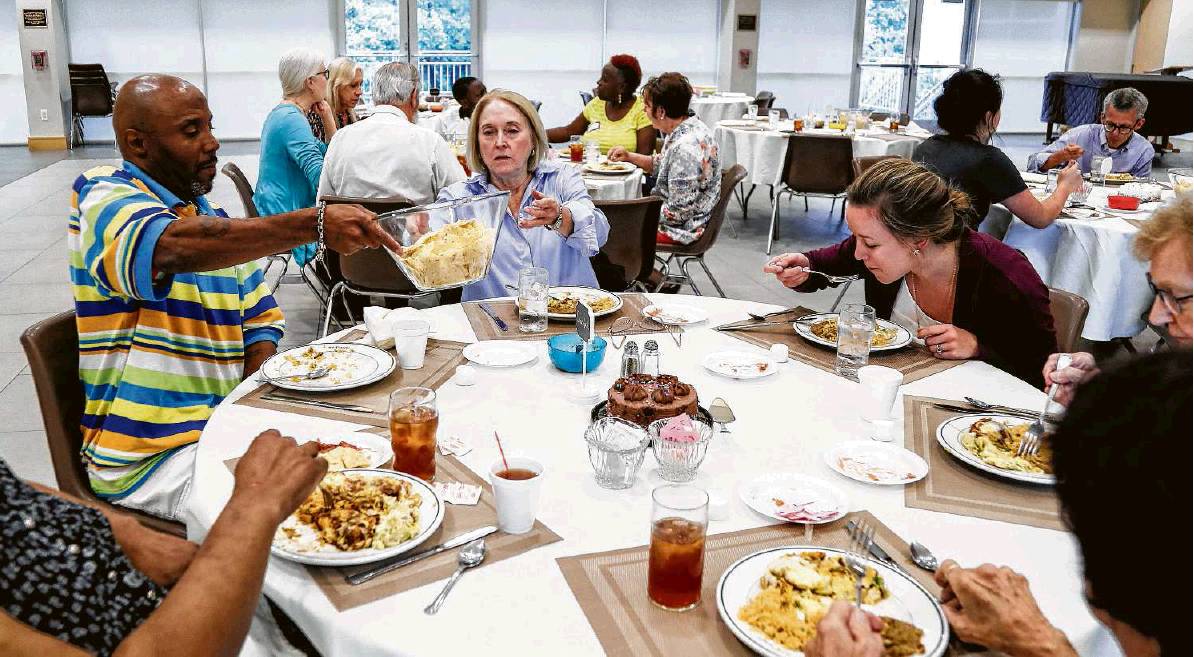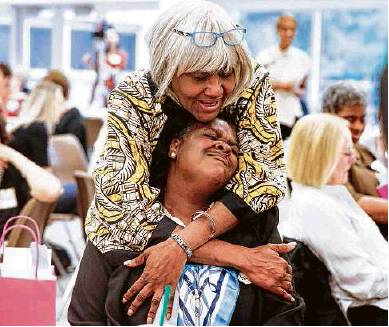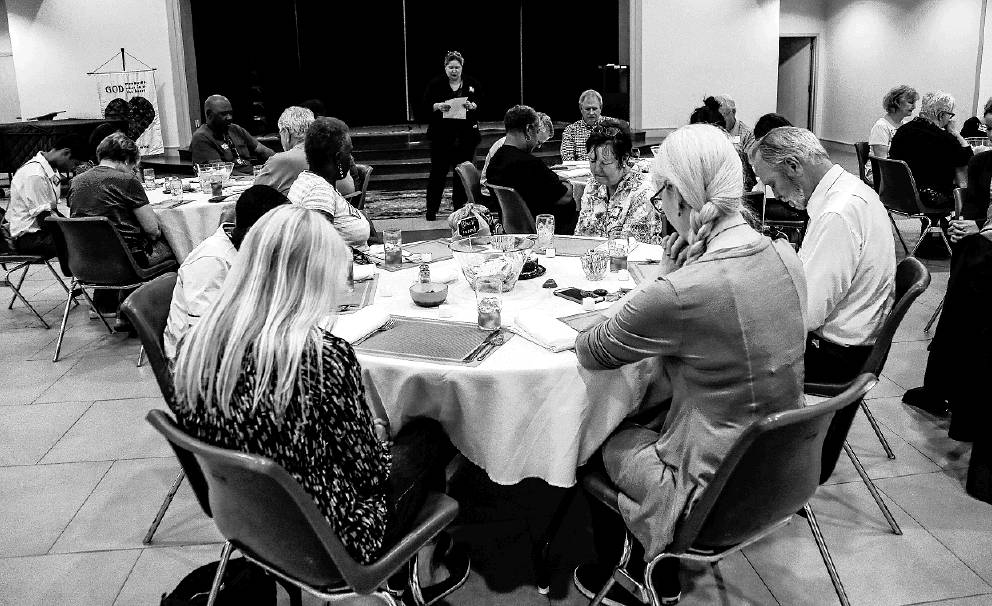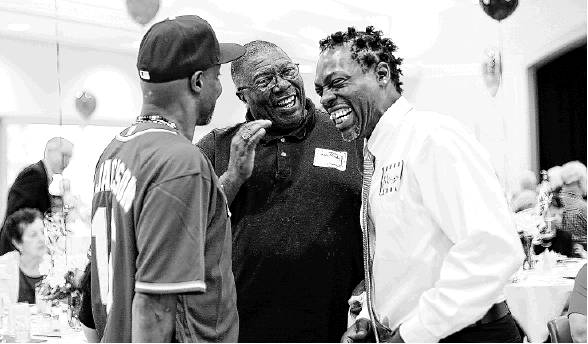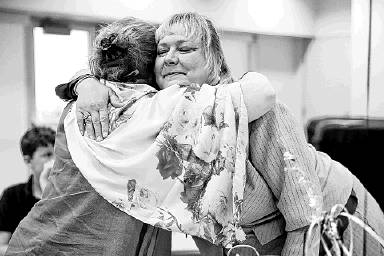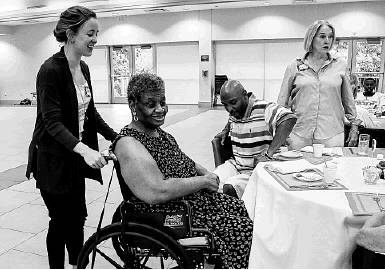OUTREACH
A sense of community comes to the table
Connecting over a meal proves powerful for those transitioning from homelessness and interfaith volunteers
By Lindsay Peyton CORRESPONDENT
What better way is there to learn about each other than over dinner, sitting side by side at a table, breaking bread together?
That’s the idea behind Coming Home, a once-a-week, 24-session program provided by SEARCH Homeless Services.
By gathering around a dinner table, the Service Emergency Aid Resource Center of Houston (SEARCH) hopes to create critical bridges in the community, connecting those transitioning from homelessness to volunteers who want to help along the way.
The way it works is simple, but group facilitator Bill Taube said the effects are lasting. By eating a meal once a week, surrounded by volunteers, clients feel less lonely or helpless.
“Even on the street, there’s this feeling that you’re alone,” Taube said. “How do you trust people? How do you use emotional support as opposed to just thinking, ‘How do I protect myself?’ ”
Each dinner is prepared and served by alocal church. St. Paul’s United Methodist Church on Main hosts each dinner.
Participating SEARCH clients eat at a table full of congregational volunteers as well as staff members.
“That’s the power,” Taube said. “It’s, ‘I used to be by myself,’ but now we’re surrounding you with a loving community. And that can be really life changing.”
Frederick Lee Jackson Sr. experienced the transformational power of the program firsthand.
“It’s acommunity, fellowship,” Jackson said. “The program has you look at yourself and your past, to see it not as negative but to find the positives. The world is full of negativity. But here are positive people who want to make sure that you’re doing well.”
Jackson enjoyed participating in the program so much that he decided to return — this time as a mentor.
“I want to give back what was given to me,” he said. “You can change. If you want to change your life, you have to be willing to change yourself.”
SEARCH’s executive vice president, Cathy Crouch, started Coming Home in Houston after learning about a similar option in New York about three years ago.
She was looking for a way to disengage from negativity that lingered in SEARCH’s housing options and build a more positive peer community.
The faith-based nonprofit was founded in 1989 by a group of residents who were concerned about the growing number of homeless individuals in Houston. First, they started a day shelter — a place for a meal, shelter and shower for those in need.
Then, Crouch explained, the organization’s focus shifted.
“It’s housing first,” she said.
Until individuals have a stable, permanent home, they are not able to focus on other areas of their lives, Crouch explained. Once housing is resolved, case managers help clients navigate the steps needed to find employment, heath care and support systems.
Still, there was a sense of isolation in the housing SEARCH provided, Coming Home’s program director Lisa Levy said.
Clients were away from peers they had while they were homeless, and they were still haunted by social stigma.
“When they move into the apartments, I’ve heard clients say that, ‘I sit and stare at my four walls. I watch TV. I don’t feel like I have a purpose,’ ” Levy recalled. “They don’t feel fulfilled.”
She said a sense of community is integral to recovery.
“Isolation is bad for your health, and community is so important for all of us,” she said. “Congregations are really good at creating community. So that’s why we asked them for help.”
SEARCH is supported by its Council of Congregations, which consists of multiple faith groups across Harris County.
Levy turned to the council for help.
“Most of our congregations now participate in some way, providing a meal or dining companions or by being mentors,” she said.
Merlene McAlevy said the call appealed to her right away, as well as to her fellow volunteers at St. Paul’s United Methodist Church.
“St. Paul’s was the perfect location,” McAlevy said. “It’s right on the bus line, and there are already three buildings with kitchens and dining rooms. We were well known and well situated.”
Now, she said, her group of volunteers has grown from eight to 25.
“It’s been very fulfilling,” she said. “It’s a wonderful program. You see community being built by the participants, from the volunteers. There’s community in the congregations that bring in food. There’s all crossing lines, and it’s beautiful.”
McAlevy added that Coming Home is not the type of program that could happen in one church. Instead, it requires and thrives because of the interfaith participation of multiple congregations.
By spending time cooking together, each congregation is able to unite, grow closer and practice the good works essential to their missions. All of the church and synagogue volunteers join together and sit down with SEARCH clients, allowing groups across faiths get to know each other.
Instead of simply serving those in need, volunteers sit alongside them, Taube said.
“It humanizes those clients,” he said. “We’re all together. Everyone is at the table. That’s how you get to know people. There’s an energy in the room.”
Levy said volunteers are able to truly understand the clients they serve. “There’s amoment where they realize that they’re not different,” she said.
For some clients, Taube added, this may be the first time they have a sit-down meal. The dinners are served on real tablecloths, with cloth napkins and real dishes.
Usually, about 14 congregations rotate serving and preparing the meals, and up to 50 individuals from various churches volunteer to serve as companions. “We’re building community in a real way,” Taube said.
There are eight participants this year.
“If a group gets too large, it’s more like a class,” Taube said. “It just can’t have that feeling. We’re looking for people to make real connections with each other.”
Case managers nominate individuals who seem like good candidates for the program and who are able to attend all 24 sessions. Each participant is paired with a mentor.
“Now there’s awhole community of people accepting them for who they are,” Taube said. “That is very powerful. It’s hard then to deny that there’s a possibility of change. That’s not one person telling you that you can be different. It’s a whole group of people coming every week to tell you that.”
This is the second year for the Coming Home program. Participants started in January. Graduation was June 25.
Last year’s participants gathered in September for a graduation potluck dinner. Each SEARCH client ended up speaking to the group, telling his or her story, and 70 volunteers listened.
“They all decided to do it,” Levy said. “Everyone cried. There was a lot of hugging.”
One participant went back to school. Two others, like Jackson, are now working with SEARCH. They are helping other clients find employment.
Taube said the power of community in Coming Home is evident. “This is something our clients never had before,” he said. “They’ve forgotten what it’s like and what it means to get support when you need it.”
Reaching out for help is something he wants to become comfortable for them — and for their hope to be restored. It’s a lesson they learn every week over dinner.
“It doesn’t even have to be said, but it’s experienced weekly,” he said.
Lindsay Peyton is a writer based in Houston.
